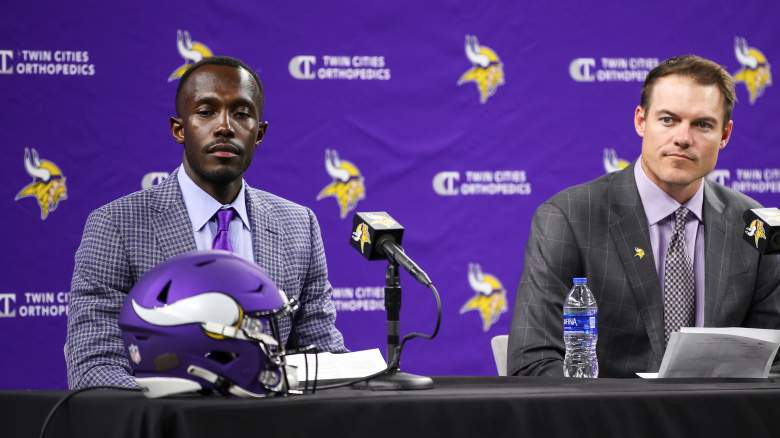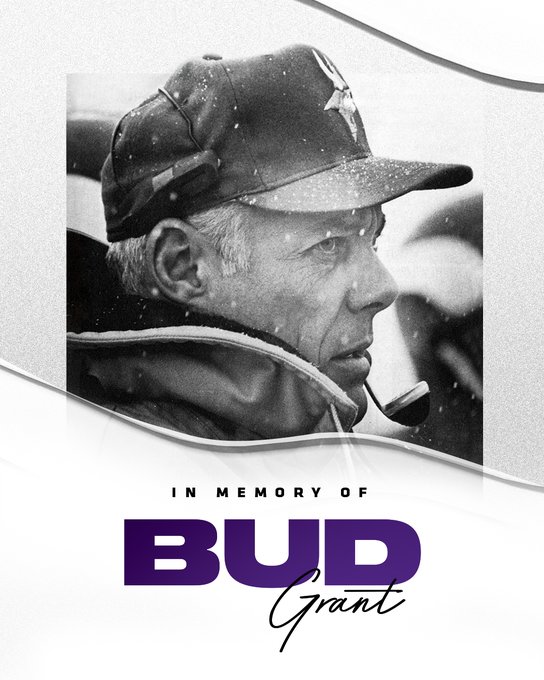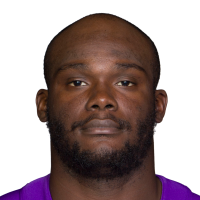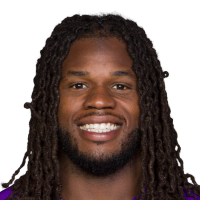
Bud Grant, the monumental Minnesota professional sports icon, died Saturday, March 11.
He was 95.
Grant played professional basketball for the Minneapolis Lakers and starred in the NFL before becoming the winningest coach in Minnesota Vikings history. He led the Vikings to four Super Bowls in 18 seasons, earning a spot in the Pro Football Hall of Fame. He remained a fixture in the organization, to the degree of having his own office at the team’s facilities, until his final months.
Grant, born and raised in Superior, Wisconsin, embodied a hard-working Midwestern mentality that Minnesotans are akin to. Selected 12th overall in the 1950 NFL Draft by the Philadelphia Eagles, Grant decided to stay in Minnesota because he wanted to play for the local Lakers, who won a championship that season. Grant eventually played football with Philadelphia before taking a better contract in the CFL with the Winnipeg Blue Bombers, where he eventually started his coaching career before becoming the head coach of a struggling Vikings franchise in 1967. He built the team into a perennial contender, making four Super Bowl appearances in his first 10 years as coach.
“Having been from here, having traveled the state playing baseball and basketball, I got to know what the fabric of this part of the world was,” Grant told the Star Tribune a few years ago. “This sounds corny, but I was proud that I was from this part of the world, which is not very well represented in the rest of the country. I’m still patriotic. I don’t wear it on my shirt or anything. But I’m patriotic. Not just for the country, but for the region, for the state, for my team. I know I represented the state, and I tried to do it well.”
Grant was one of the most recognized figures in Minnesota history, remaining a staple figure and approachable through his annual garage sales in his final years.
Vikings coach Kevin O’Connell wrote in a statement: “Bud was gracious with his time, meeting in his office weekly to discuss football and life. I will forever cherish those conversations because they made me a better coach, a better husband and father and a better person.”
The team’s principal owners, Zygi and Mark Wilf, added, “No single individual more defined the Minnesota Vikings than Bud Grant. A once-in-a-lifetime man, Bud will forever be synonymous with success, toughness, the North and the Vikings.”
Bud Grant Channeled Minnesota Grit Into the Purple People Eaters
Footage of Grant’s days as a coach showed a stoic, clean-shaved face that overlooked blustery winter conditions on the field. He demanded his teams to play without gloves and heaters on the sidelines, instilling a tenacity to bear through the cold conditions that became one of the greatest home-field advantages in the league.
But beyond the ruggedness of Grant’s approach, was a great nurturer of talent and men.
“He never yelled, he never screamed, he never berated, but he was a great, great leader and a great, great coach,” Fran Tarkenton said, via Vikings.com. “I was privileged to play for him. If you could not play for Bud Grant, you could not play.”
“I don’t deny that he sometimes looks like he’s a little cold out there … some people called him ‘stone-faced,’ ” Bill Brown, who played under Grant from 1967 to 1974, added. “Well, I knew Bud pretty well and could talk to him any time, and I didn’t have any problem. We’d kid back and forth, and he was probably the biggest practical joker I’ve ever seen.”
Grant’s innate ability to both uplift and motivate his players led to wellspring Vikings Legends and future Hall of Famers. His vaunted defensive line, the Purple People Eaters — Carl Eller, Alan Page, Gary Larsen and Jim Marshall — became one of the most dominant defensive lines in NFL history.
“There are many different sides to Bud Grant, and I think the public only had an opportunity to see one – and that was the stone-faced coach standing on the sidelines, and nothing seemed to affect him. No emotion,” Marshall told Vikings.com. “But he was a very emotion-filled human being.”
Bud Grant Was Minnesota to the End
Grant’s exterior toughness did not wane in his old age.
After being inducted into the Pro Football Hall of Fame in 2016, Grant, 88 years old at the time, strolled out onto the cold turf at then-TCF Stadium on the University of Minnesota campus to be honored at midfield in nothing but a short-sleeve polo.
The temperature was minus-six degrees.

















































































Comments
Legendary Vikings Coach Dies at 95